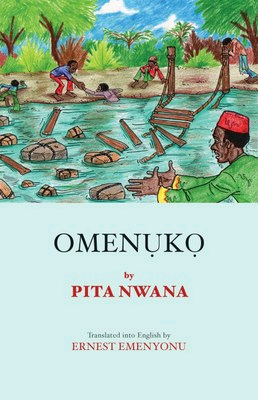Igbo Literature
Igbo literature encompasses both oral and written works of fiction and nonfiction created by the Igbo people in the Igbo language.
It reflects the cultural heritage, history, and linguistic diversity of the Igbo community.
History
Oral Literature
In the precolonial era, Igbo literature existed in oral forms:
- Chants, especially by women during rituals and childbirth ceremonies
- Folk songs, narrative poetry, and storytelling (ife)
- Proverbs, reflecting wisdom of the elders
- Riddles, for child entertainment and learning
Oral storytelling was categorized into:
- Tales with songs
- Tales without songs
- Tales sung without prose
It was typically shared at night under moonlight, told by mothers or young adults, sometimes with musical accompaniment.
Written Literature
Before colonial influence, the Igbo used writing systems like:
- Nsịbịdị – prevalent in Aro and Cross River
- Uli – used by the Ngwa
- Akwụkwọ mmụọ – in Okigwe
- Aniocha scripts – in western Igboland
These systems declined after the introduction of Western education.
Key Early Publications
- 1777 – History of the Mission... by G.C.A. Oldendorp included two forms of Igbo
- 1789 – The Interesting Narrative of the Life of Olaudah Equiano included 79 Igbo words
- 1837 – Scottish explorer Macgregor Laird compiled an Igbo wordbook
Missionary Influence & Linguistic Development
- 1841 – Niger Expedition: Edwin Norris, James Schön, and Samuel Ajayi Crowther began documentation of the language
- 1857 – Crowther's Igbo primer (Isuama dialect)
- 1861 – Schön & Taylor published Oku Ibo: Grammatical Elements of Ibo Language
- 1869 – Taylor published Igbo proverbs
- 1881–1883 – Crowther and Schön compiled the first Igbo dictionary
- 1892 – Julius Spencer published An Elementary Grammar of the Igbo Language
Notable Translations & Literary Milestones
- 1913 – Thomas John Dennis translated the Bible into Union Igbo
- 1923 – Israel E. Iwekanuno’s Akuko Ala Obosi
- 1933 – First Igbo novel, Omenuko by Pita Nwana
- 1937 – Ala Bingo by D.N. Achara
- 1963 – Ije Odumodu Jere by Leopold Bell-Gam
Periods of Igbo Literature
- Isuama Period – early dialectal literature
- Union Igbo Period – Owerri/Umuahia dialects
- Central Igbo Period (1941 onward) – Standardization based on Central dialect
- Post-Civil War (Standard Igbo Period) – Political themes and wider literary spread
Traditional and Modern Theatre
Traditional Igbo theatre is described as "total theatre", combining:
- Music
- Dance
- Masquerade dramas (ancestral worship)
- Visual storytelling
Notable Traditional Performances
- Odo and Aba Ugwu – Nsukka and Udi
- Okumkpa – Afikpo
- Owu and Ikoro – Ngwa
Modern Igbo Theatre
- Emerged in 1974 with Udo Ka Mma by Anelechi B. Chukuezi
- Plays became part of school curricula to broaden readership
Traditional and Modern Poetry
Igbo poetry is categorized into:
- Panegyric poetry – childbirth, love, rituals
- Elegiac poetry – war, satire, funerals
Early Influences
- 1934 – Church Missionary Society translated hymns and Book of Common Prayer
- Often criticized as religious propaganda rather than genuine literary effort
Civil War & Resistance Poetry
- Joseph C. Maduekwe – Onyekulum chants for Biafran soldiers (oral poetry)
Written Poetry Emerges
- 1971 – Poetic Heritage by Romanus N. Egudu & Donatus Nwoga
- 1975 – Akpa Uche – First true anthology of written Igbo poetry
- Edited by Romanus M. Ekechukwu
- Contained 65 poems by 13 poets
Since 1975, 52 anthologies of written Igbo poetry have been published.
Notable Igbo Writers
Anthony Uchenna Ubesie (1950–1994)
A pioneer of modern Igbo fiction. Notable works include:
- Ukwa Ruo Oge Ya Ọ Daa (1973)
- Isi Akwu Dara Nala (1973)
- Mmiri Oku Eji Egbu Mbe (1974)
- Ụkpana Okpoko Buuru (1975)
- Jụọ Obinna (1977)
Julie Onwuchekwa (b. 1944)
Author of Chinagọrọm, notable for feminist themes in Igbo literature.
Ude Odilora
Secondary school teacher and author of Okpa Aku Eri Eri (1981),
a widely read novel addressing materialism in Nigerian society.
Chief Frederick Chidozie Ogbalu (1927–1990)
Key figure in standardizing the Igbo language.
Founded the Society for Promoting Igbo Language and Culture
and helped publish many early Igbo literary works.
See Also
- Igbo Culture(#)
References
Citations
Various historical sources and missionary records, including works by Oldendorp, Schön, Crowther, Taylor, and others.
Bibliography & Further Reading
Emanajo, E.N. (1986). The artist and his society: the situation in creative literature in Igbo.
Black Orpheus: A Journal of African and Afro-American Literature, 6(1), 8–16.Emenyonu, Ernest N. (1978). The Rise of the Igbo Novel. Ibadan: Oxford University Press.
Emenyonu, Ernest N. The Literary History of the Igbo Novel: African Literature in African Languages. Routledge.
